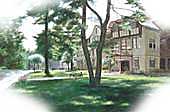Fall
1989
The Power of a Disciplined
Spirit
John Wright Follette.
"For God hath not given us the spirit of fear;
but of power, and of love, and of a sound
mind" 2 Timothy 1:7.
There was a manifestation of the life of Christ in the early
Church that was powerful enough to move an entire nation.
Rome was greatly affected by it, and nations ever since have
been affected. Although the members of this early Church had
received the Baptism in the Holy Spirit and were used in the
gifts of the Holy Spirit, there were "qualities"
which were added to these gifts that caused this powerful
impact upon nations.
Jesus said He would give us the power to become "His
witnesses." This includes much more than the ability
to do the works that He did. He was referring to a quality
of life, an element of the Spirit which would become the "agape"
of the Son of God resting within us. The early Church moved
under the influence and power of this agape (sacrificial love)
until all this became a dynamic in the hands of God by which
He was able to affect and move a nation.
The first factor that is common to building a Christian life
applies also inthe building of the Church. Thus, the tutoring
that is directed toward the individual is also given for the
whole Body. "But ye shall receive power, after that the
Holy Ghost is come upon you: and ye shall be witnesses"
Acts1:8a. This is not speaking of "power" to go
out and witness, for each individual should do this upon receiving
salvation. This baptism is to be the dynamic (Greek - "dunamis")
by which the Church will be built.
Although Jesus teaches us the necessity of receiving this
power, it is dangerous to allow its impact to overrule us.
The same power that we feel when e are filled with the Spirit
is the very power that can make us almost irrational with
its moving. In response to a manifestation of this power,
we feel we must do something, but we are not quite sure what
it is. Then we become agitated and confused because the result
is not what we expected. We must come to understand that another
element is being added.
He has given us not only the power to become witnesses, but
also the power of love. This word "love" is not
an emotional love. It is "agape," a love that can
only be measured by sacrifice. It is not "phileo,"
or brotherly love. The Lord wants us to distinguish between
these words. "Agape" implies sacrifice; He tells
us that He has loved us with this kind of love.
In building our spiritual life, the field of motivation must
be carefully thought out. There must be a right motivation
behind each manifestation, as we respond to the power of the
Holy Spirit moving within us. The word used for love"
in this verse speaks of a love that motivates us to action.
That which is motivated by the love of Jesus Christ, sacrificial
"agape" love, will pass the test of time.
I Corinthians 13 is a beautiful chapter, but many never see
the truth that is hidden within because they extract it from
its setting. To understand the 13thchapter of I Corinthians,
chapters 12, 13, and 14 must be read together as one. The
gifts which are mentioned in chapter 12 are to be correctly
motivated by the love shown in chapter 13.
The law that governs in this arrangement is not "a more
excellent gift." For love is not a gift, rather it is
a fruit. "Love" is the law by which the gifts re
to operate. Why does the Lord say, "Yet shew I unto you
a more excellentway?" Because the way the gifts had been
used brought confusion into the Church. They had all of the
gifts, but the motivating power behind them resulted in pride,
disturbances, and other problems. Therefore he says, "Yet
shew I unto you a more excellent way (not thing). In other
words, I will show you the motive that should govern the use
of the gifts of the Holy Spirit."
Paul said that in the sight of God, their words sounded like
a sounding of brass or a tinkling cymbal. This was not what
they were hearing, but what God heard. God was hearing confusion
and noise. Why? "Though I have all the gifts and the
power to do all these things, if I do not have agape, that
broken bleeding heart of Jesus, as the motive for the working
of these gifts in my life, they will sound like a racket."
"Though I speak with the tongues of men and of angels,
and have not charity(agape), I am become as sounding brass
or a tinkling cymbal. And though I have all faith, so that
I could remove mountains, and have not charity, I am nothing"
I Cor 13:1-2.
Notice that "I am nothing." It is not that the
gift is nothing, rather "I" am nothing. "And
though I bestow all my goods to feed the poor, and though
I give my body to be burned, and have not charity, it profiteth
menothing" I Cor 13:3. It may profit others, but it will
not profit me unless agape, the love of God, is the motivating
force.
What else does He say? "I have not only given you this
gift of power along with love as the motive by which the gift
will be manifest; I have also given you a sound mind."
This word means a "disciplined spirit." We may have
all of the gifts, properly motivated by the love of God, but
if there is not a disciplined spirit to go along with them,
their purposes will not be accomplished.
What is a disciplined spirit? This is a military term. Paul
uses many military terms. The word here is used in connection
with a general who has been disciplined in order to discipline
in turn. He himself is under discipline so that the authority
he now exercises will have credibility. One may have both
power and love, but unless there is a "disciplined spirit"
behind them, they will accomplish little.
When Jesus called James and John, He saw coming towards Him
two young men whom He named "Sons of Thunder." God's
hand was upon them, but they were not yet acquainted with
its meaning.
They were given authority to go out and minister, but John
came back disturbed because the people in the city where he
preached would not receive the Lord. John asked Jesus, "Do
you want me to call down fire from heaven to consume them?"
(Luke 9:54). John had the power to do this, because Jesus
had given it to him. Now John loved the Lord and wanted Him
to be appreciated. Therefore, when His ministry was rejected,
John wanted them to be punished.
The Lord turned to John and said, "You know not what
spirit you are of." The difficulty was not in power,
nor with love. This reaction was due to a problem in John's
spirit. We must be motivated before we can accomplish anything
for the Lord, but this is insufficient. John had both power
and love, but his motivation was marred.
The difficulty was in the undiscovered, inner resources of
John. There is yet territory to be taken within each of us,
vast areas within our lives that are not yet conquered; and
the Lord needs to triumph in them.
Power, love; each of these has their part. Now, a disciplined
spirit is to be added. The Lord had seen John as a "Son
of Thunder," but He did not intend to let him remain
as such. He used John in places where he would be able to
"thunder" for awhile. But the time came when God
wanted to talk with him, so He took him to Patmos, a barren
isolated island, where he had no one to "thunder"
at. This was to be a time of quiet, a time to think, with
nothing else to do.
The Lord was after John; He is after us, even more than He
is interested in anything we will ever do for Him. When "you"
have been set on an Isle like this by the Lord, be careful
not to accept the suggestions of all those who are willing
to row you back to where you were, because "you"
are so needed. The Lord placed you there; let Him keep you
there! People may attempt to hinder you, but be determined
to make time and room for the Lord to make the necessary conquest
within your life.
When the thunder had become silent within this man, and the
Lord had accomplished His purpose, He came to him and gently
said - "John." John had heard this voice before.
"Can it be my Lord?" Then the Lord said, "I
have a message for you. It is not only for you but for the
Church as well. It will be projected down through thousands
of years. Let me bring this forth through you."
John's heart was already broken, so just the call of his
name was like a balm, and he understood. "I John, who
also am your brother, and companion in tribulation, and in
the Kingdom and patience of Jesus Christ, was in the isle
that is called Patmos, for the Word of God, and for the testimony
of Jesus Christ. I was in the Spirit on the Lord's day, and
heard behind me a great voice, as of a trumpet" Rev 1:9-10.
Have you ever been "in the Spirit?" We know we
are to walk in the Spirit, but have we experienced what it
is to be caught up in the intimate movings of God? How marvelous
it is when we find that "I have come back to my real
habitation." This "being in the Spirit" is
the place for which we were created.
God gave John a vision, and in it He covered every element
of the earthly realm: the world, all creation, the skies,
moon, stars, animals, trees, people, cities, nations, floods,
winds, thunder, lightening. God used every tangible thing
that John had ever known to make a most complicated, yet marvelous
display. God has thundered in Revelation. But, did you hear
John thunder in Revelation? No, all that was gone.
What is the difference now? God is thundering through John.
God did not call John because he could thunder. He did not
want John's thunder. He wanted John's capacity for thunder,
so that He could thunder through him. A marvelous change has
taken place within his spirit. When John came back from the
Isle of Patmos, we read, "Little children, let us love
one another." There is a tenderness, a brokenness, and
a graciousness that was not evident when John thundered.
So it is with our development. We have this capacity for
thunder within us, and He will let us move along for awhile
in our own thunder. But someday God will come after us and
say, "I am going to dry up your thunder." He will
put us on an "Isle of Patmos" and everyone will
wonder what in the world is wrong with us. Do not return such
a one to shore! He is bringing forth a disciplined spirit
within this one.
When the Lord begins to deal with us to accomplish within
us His purposes, let us not be fearful, for He has not given
us a spirit of fear. He has a purpose in view for us, both
in time, and in the ages to come. We are safe and secure in
the hands of the living God.
"He who hath begun a good work in you will
also finish it" (Phil 1:6).


